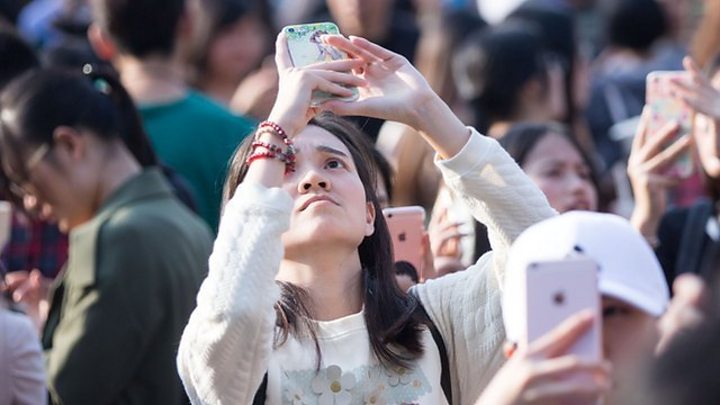AFP / Getty
Last year's Singles Day sales amounted to $ 18 billion (£ 14 billion)
I still remember growing up in communist China in the 1970s, when my mother and neighbors would use their ration tickets to buy meat at a state-run store.
Very little thought went into shopping because there was not much to buy. [In] 1980s, shopping in Beijing was little better
Back then, shopping was just something It is certainly not the big extravaganza it has become the popularity of Singles Day.
Now in its ninth year, the day is officially called the 11.11 Global Shopping Festival. 11.11 stands for the 11 November when it is held. The two types are chosen to symbolize the wishes by single people to be in a relationship, as the two elevators next to one another like like two couples.
It was originally a non-commercial festival started by male college students who did not have a girlfriend. They created a day to get together to celebrate bachelorhood.
But the Chinese retailer Alibaba caught onto it and has turned it into the largest online shopping day in the world. Alibaba says more than one million retailers worldwide are participating this year, including the US department store Macy's.
They say that last year's sales amounted to $ 18bn (£ 14bn). This year's total has already surpassed this. And here's what impressed me the most: Alibaba handled 175,000 transactions every second during a peak period in last year's Singles Day.
As I digest these figures, wearing the same style of button-down shirts and elastic-waisted baggy trousers - so-called Mao suits. We are lucky if we got a set of new clothes once a year.
Relatives and friends have proved to me how widespread Singles Day has become. One of my cousin buys six months' worth of household supplies on that day. A friend spends as much as $ 500. Some people spend much more.
So what happened to bring about this dramatic change in China?
I attribute it to Chinese people's strong sense of curiosity and willingness to try new things. After all, they had few choices in previous decades.
But also - the love of a good bargain!

Media playback is unsupported on your device
Discounts can be 30% or more, but there's a limited supply on the best buys, so shoppers stay up past midnight on their computers to fight for the good deals.
Shoppers can use apps to virtually try on clothes before they buy them. Ahead of Singles Day is a lot of events, including a four-hour fashion show. Viewers on their mobile phone can take online purchases of the clothes they see the models wearing. Local shops can deliver to their door.
But what happened happened to the traditional Chinese values I was raised on - thriftiness, frugality, and getting on with what you have?
Image copyright
AFP
A delivery man delivers parcels during Singles Day in Shanghai
They have been shoved aside. At least by some well-to-do and increasingly wasteful middle-class urban dwellers. (19459012) Regardless, Singles Day is a wakeup call for Chinese people. They've got to do things the way they want to win them over.
At the stroke of midnight, when the world's largest single-day shopping event kicks off, it is a reminder of just how far China has come.
Cindy Sui is a Taiwan-based BBC correspondent who has lived and worked in China for many years.
